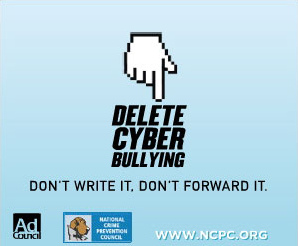
 What? My child? A cyberbully? Never...
What? My child? A cyberbully? Never...
It's easier to believe that your tween or teen could be a victim of cyberbullying than to believe that they could actually be engaging in cyberbullying behavior.
But statistics show that cyberbullied children are also likely to be cyberbullies themselves, at least some of the time. It may be in order to get revenge or completely unintentional. Kids may not even realize that some of the 10 behaviors below are actually forms of cyberbullying:
-
Forwarding personal texts or photos. Sending on a sext or a private IM conversation is mean, and it could get a child in deep trouble or even suspended from school.
-
Impersonating someone else online. Cyberbullies might post as if they were another person, creating a screen name similar to theirs or actually hacking into their account and pretending to be them.
-
Changing someone's email password. Gaining access to someone's accounts and locking them out by changing the password is never funny.
-
Getting in a “warning war.” Save the “warn” button for users who actually go over the line. Misusing the warn button to get someone kicked off a site when they did nothing wrong is cyberbullying.
-
Rating people or voting at an online bashing site. Rating the hottest girls in school or voting for the stupidest or sluttiest is definitely cyberbullying. Ditto goes for creating these polls.
-
Logged onto someone else's account. Reading someone else's emails or private information without their permission by accessing their account is a form of cyberbullying.
-
Talking trash in online gaming. It's easy to cross a line unintentionally when other players can't see facial expressions or hear tone of voice. Trash talk can be easily perceived as cyberbullying.
-
Signing people up for things online. Never sign another person up for newsletters, mail lists, or pornography.
-
Posting pictures or information about others. If it's not yours to post, then you should always ask the person's permission before sharing.
-
Changing profile or away message to embarrass or intimidate someone. Using a profile or away message to make a snide comment about someone else might seem clever, but it's cyberbullying
Cyberbullying is a lot more than just making a rude comment on their Facebook Wall. It encompasses all kinds of online intimidation, harassment, and humiliation.Could your child be cyberbullying someone else without knowing it?



